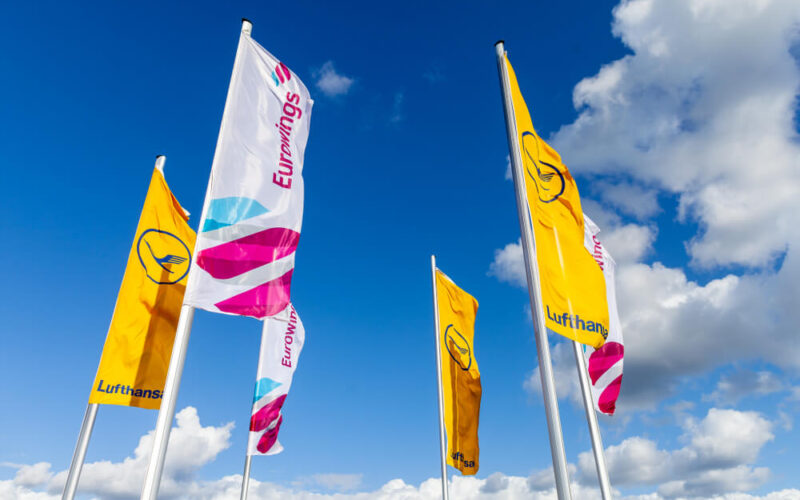Lufthansa Group has announced further strengthening its long-haul network and will add new routes to multiple North American cities and Bangalore (BLR), India, starting from summer 2020. Interestingly, some of the destinations will be operated by Eurowings, the airline that was supposed to exit the long-haul business.
Lufthansa’s (LHAB) (LHA) Munich (MUC) hub is getting the most of the spotlight with five new destinations –and two new routes are also opening in Frankfurt (FRA). The new city destinations in the United States include Anchorage, Detroit, Las Vegas, Orlando, Phoenix and Seattle. Lufthansa (LHAB) (LHA) is introducing these new routes to accommodate the demand in long-haul holiday travel, which according to the press release is “rising sharply”.
The competition on these routes is thin – currently, most of the direct flights, if served, are flown only by Condor. But the leisure airline, which is a subsidiary of Thomas Cook, is put up for sale. Lufthansa (LHAB) (LHA) was among the parties interested in the purchase, reports back in May 2019 hinted. Since the initial announcement on May 7, 2019, no more news has followed about the acquisition.
Lufthansa (LHAB) (LHA) is throwing Eurowings to compete with leisure airline. This can be an attempt to force Thomas Cook’s hand to sell Condor, reduce the price of the German subsidiary or completely drive out Condor out of these routes, as Thomas Cook group is currently experiencing financial difficulties. Lufthansa (LHAB) (LHA) has the resources to compete with Condor, especially if their main weapon of choice is Eurowings – operating under a low-cost carrier model, the ticket prices can align to the needs and capabilities of leisure travelers, without costing too much money for Lufthansa (LHAB) (LHA) to operate the flights.
Thorsten Dirks, the CEO of Eurowings has also hinted that Lufthansa (LHAB) (LHA) deployed Eurowings on these routes to tailor to families and holidaymakers:
“With the new 2020 summer destinations from Munich and Frankfurt, we are demonstrating once more how we combine the strengths of the two airlines to the benefit of our customers: with a product range tailored to holidaymakers and families and with a fresh, modern, innovative on-board product from Eurowings – supported by Lufthansa’s (LHAB) (LHA) marketing and sales power”.
Eurowings exiting long-haul
But why is Lufthansa (LHAB) (LHA) announcing new long-haul routes for Eurowings, if back in June 2019, the German airline group stated that it was repositioning the low-cost carrier to focus on short-haul connectivity?
While an attempt to strengthen Lufthansa’s (LHAB) (LHA) position “in the growing market for long-distance tourist travel” partially answers the question, there is a difference in how these long-haul routes will be operated.
During the same Capital Markets Day in June, Lufthansa (LHAB) (LHA) has presented that Eurowings will transfer “commercial responsibility for long-haul business to Network Airlines” and will “increase connectivity and benefit from synergies in sales, distribution and IT”, meaning that these flights will most likely will be marketed as Lufthansa (LHAB) (LHA) flights, rather than Eurowings. Passengers will also be able to book the new destinations via Lufthansa’s (LHAB) (LHA) usual booking services, further increasing the potential consumer base. Eurowings’ CEO comments have further pushed this narrative, as he mentioned that the new routes will be supported “by Lufthansa’s (LHAB) (LHA) marketing and sales power”.
Furthermore, passengers will be able to connect much easier. Eurowings currently operates long-haul flights only from Düsseldorf International Airport (DUS), but the switch to operate these flights from Munich and Frankfurt provides the opportunity to establish one-stop connections much easier. Both Frankfurt (FRA) and Munich (MUC) have numerous connecting flights from other European and German cities, as Lufthansa (LHAB) (LHA) uses these two cities as a hub for long-haul operations.
The point-to-point model that Eurowings operates does not provide many opportunities for passengers to connect onto their final destinations, thus the change to fly to the U.S. from Frankfurt (FRA) and Munich (MUC) provides a lot of flexibility for passengers and the airline.
While at first, the move might not make sense, it is understandable. Eurowings still has their Airbus A330 and deploying them on intra-European routes would incur a lot of losses for the low-cost carrier. Instead, now Lufthansa (LHAB) (LHA) will use wide-bodies to serve new routes and increase capacity in the market, in which the airline sees rapidly rising demand for more seats. In addition, Lufthansa (LHAB) (LHA) will let Eurowings focus on expanding and redeveloping their short-haul business, as it will take care of the sales and marketing for the new summer routes.

